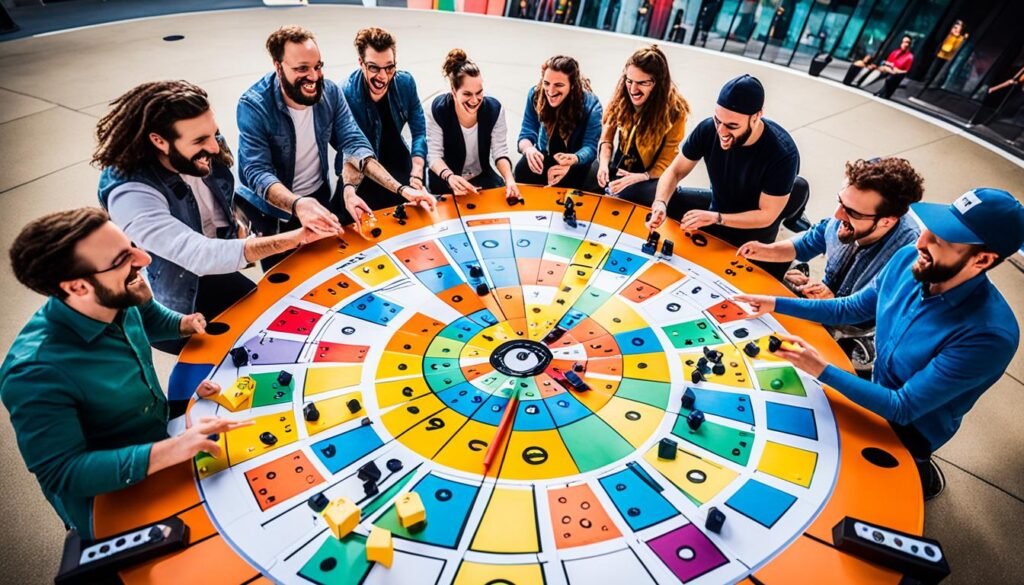Music theory games offer a fun and interactive way to enhance your musical skills. Whether you are a beginner or an intermediate musician, these games can help you sharpen your ear training, rhythm, and note recognition abilities. By playing interactive games that focus on melody, pitch, chord progression, and more, you can take your instrument playing to the next level and become a more skilled musician.
Key Takeaways:
- Music theory games provide an interactive learning experience for musicians of all levels.
- These games help develop important skills, such as ear training, rhythm, and note recognition.
- Online music theory games are available for beginners and intermediate musicians.
- Playing music theory games can improve aural skills, tempo understanding, and recognition of musical symbols.
- Music theory games for kids are designed to be engaging and educational, making learning fun for young musicians.
The Benefits of Music Theory Games
Music theory games offer several benefits to musicians of all levels. These interactive games provide an engaging and fun way to enhance your musical skills while learning essential concepts. Whether you’re a beginner or an experienced musician, incorporating music theory games into your practice routine can have a positive impact on various aspects of your musical journey.
Improved Ear Training
One of the key benefits of music theory games is the improvement of ear training. These games help you develop a better sense of pitch by training your ears to recognize different tones and intervals. Through repeated exposure and practice, you’ll become more adept at identifying and interpreting chords, melodies, and rhythms.
Enhanced Note Recognition
Music theory games also strengthen your note recognition skills. By engaging with interactive games that challenge you to identify and name notes, you’ll become more proficient in reading sheet music and understanding the relationships between musical symbols and pitches. This skill is essential for sight-reading and improvisation.
Deeper Understanding of Chord Progressions
Understanding chord progressions is crucial for musicians in various genres. Music theory games provide an opportunity to develop a strong grasp of chord progressions and their harmonic relationships. By playing these games, you’ll learn to recognize and analyze different chord sequences, which will improve your overall musicianship and songwriting abilities.
Improved Instrumental Skills
Music theory games can enhance your instrumental skills by helping you memorize and play challenging rhythms. Many of these games involve interactive exercises that require you to play along with specific rhythm patterns, improving your timing and accuracy. Mastering these rhythm skills will translate to better overall performance on your instrument.
Foster Creativity and Improvisation
Music theory games foster creativity and improvisation skills, which are essential for musicians looking to explore and express themselves through their music. These games encourage you to experiment with different melodies, chord progressions, and improvisational techniques, allowing you to develop your unique musical style.
Whether you’re seeking to strengthen your musical foundation, improve specific skills, or unleash your creative potential, music theory games provide a valuable and enjoyable way to enhance your musical journey. With their interactive nature and focus on key concepts such as ear training, note recognition, rhythm, and chord progressions, these games offer a well-rounded and engaging approach to learning music theory.
Interactive Music Theory Games for Kids
Music theory games for kids offer an interactive and engaging way for young learners to explore and understand the fundamentals of music theory. Designed specifically for beginners, these games provide a fun and educational experience that introduces important concepts in an entertaining manner. Through interactive gameplay, kids can develop their knowledge of note names, rhythm patterns, music symbols, treble clef, tempo, and more.
By incorporating elements that are familiar to kids, such as colorful visuals and catchy tunes, these games create an immersive and enjoyable learning environment. The interactive nature of these games encourages active participation, ensuring that kids are fully engaged in the learning process.
One example of an interactive music theory game for kids is “Note Ninja,” where players have to identify note names and their positions on the staff. This game helps kids develop their note recognition skills while having fun slicing notes like a ninja.
“Note Ninja is an amazing music theory game! My kids love it so much that they practice note names without even realizing it. It’s interactive, visually appealing, and educational – the perfect combination!” – Parent Review
Another popular game is “Rhythm Master,” where players match rhythm patterns to different music styles. This game helps kids understand rhythm and develop their timing and coordination.
| Game | Concepts Covered |
|---|---|
| Note Ninja | Note names and positions |
| Rhythm Master | Rhythm patterns and timing |
These interactive music theory games for kids not only teach essential music theory concepts but also help young musicians in their overall musical development. By making learning fun and engaging, these games motivate kids to explore and appreciate the world of music.
So if you’re looking for an interactive and educational way to introduce your child to music theory, these games are an excellent choice. Let your child embark on a musical journey filled with fun, learning, and creativity.

With interactive music theory games for kids, learning becomes an adventure!
Sharpen Your Ear Training with Music Theory Games
One of the key skills for any musician is ear training, and music theory games provide an excellent way to develop and sharpen this critical ability. These games focus on various aspects of ear training, including pitch recognition, intervals, melodic patterns, rhythmic patterns, and chord recognition. By actively engaging with these games, you can enhance your aural skills and learn to differentiate and distinguish tones with greater accuracy and speed.
Ear training is essential for musicians because it allows them to listen to and understand music more deeply. By training your ear, you can recognize and identify different musical elements, enabling you to play and perform music with greater precision and expression.
Music theory games create a fun and interactive environment for practicing and improving your ear training skills. As you play these games, you will become more adept at identifying different pitches, intervals, and melodic patterns. You will also develop your ability to recognize rhythmic patterns and chord progressions, which are fundamental to understanding and playing music.
Not only do these games offer the opportunity to reinforce your aural skills, but they also provide a platform to practice your instrumental skills simultaneously. By playing along with the music and accurately identifying and reproducing the musical elements, you can train your ear while improving your instrumental accuracy and speed.
Consistent practice with music theory games will not only enhance your ability to differentiate and distinguish tones but will also deepen your understanding of the relationships between these tones and how they contribute to the overall character and structure of a piece of music.
Here’s a table showcasing the various aspects of ear training that music theory games can help you develop:
| Aspect of Ear Training | Skills Developed |
|---|---|
| Pitch Recognition | Ability to identify and reproduce different pitches accurately |
| Intervals | Recognition and understanding of the distance between two pitches |
| Melodic Patterns | Identification and reproduction of patterns in melodies |
| Rhythmic Patterns | Recognition and reproduction of rhythmic patterns and beats |
| Chord Recognition | Ability to identify and reproduce different chords accurately |
By regularly practicing with music theory games, you can significantly improve your ear training skills and become a more confident and proficient musician. Whether you’re a beginner looking to develop a strong foundation or an experienced musician aiming to refine your abilities, incorporating these games into your practice routine can have a transformative impact on your musical journey.
So why not add some fun and interactive ear training exercises to your practice sessions? You’ll not only enjoy the process but also unlock the full potential of your musical abilities.

Remember, practice makes perfect, and with music theory games, you can make your practice sessions engaging and effective!
Enhance Your Rhythm Skills with Music Theory Games
Music theory games are not only effective for improving your understanding of music theory concepts but also for enhancing your rhythm skills. These games provide a dynamic and engaging way to develop a strong sense of rhythm, allowing you to clap or tap along to different rhythm patterns. By actively participating in these games, you can strengthen your ability to recognize and reproduce rhythmical sequences with accuracy and precision.
One of the key benefits of rhythm-focused music theory games is the improvement of music reading skills. As you play these games, you will become more proficient in reading and interpreting rhythm notation, which is essential for sight-reading musical pieces. Additionally, these games facilitate auditory recognition, allowing you to train your ears to identify and differentiate various rhythm patterns. This auditory recognition is crucial for developing a solid rhythmic foundation.
The rhythmic challenges presented in music theory games also enhance your musical memory. By practicing rhythmical sequences repeatedly, you can improve your ability to internalize and retain complex rhythm patterns. This improves your overall musicianship and contributes to your ability to perform or compose music accurately.
Furthermore, rhythm-focused music theory games greatly contribute to the development of sight-reading skills. Sight-reading involves reading and performing a musical piece on the spot without prior practice. By engaging in rhythm games that present various rhythm patterns, you can fine-tune your sight-reading abilities and confidently navigate through unfamiliar rhythmic challenges.
In summary, music theory games that focus on rhythm provide an effective way to enhance your rhythm skills and overall musicianship. Through these games, you can improve music reading, auditory recognition, musical memory, sight-reading, and develop a strong sense of tempo and beat accuracy. Incorporating rhythm-focused games into your practice routine will undoubtedly help you become a well-rounded musician with exceptional rhythm abilities.
Dive into Chord Progressions with Music Theory Games
Music theory games offer a unique and engaging way to explore chord progressions and deepen your understanding of harmonic relationships in music. By playing these games, you can enhance your ear training skills, recognize major and minor chords, identify tonal centers, and learn how progressions create different variations of a song.
Chord progressions are the backbone of many musical compositions, providing a structure and emotional context. Understanding how chords function within a progression is crucial for musicians of all levels. Music theory games allow you to explore and experiment with chord progressions in a fun and interactive way, enabling you to develop a stronger grasp of tonality and harmonic relationships.
When playing chord progression games, you’ll have the opportunity to train your ear to recognize different chords and their relationships to the tonal center. This type of ear training is invaluable for musicians looking to improve their overall musicality and ability to play by ear.
Additionally, music theory games often present various progressions and challenges, allowing you to practice your chord recognition and progress through different levels of difficulty. These games provide a structured approach to learning chord progressions, helping you develop a deeper understanding and aural recognition of the harmonic relationships that exist within a piece of music.
Here is an example of a simple chord progression table:
| Tonal Center | Chord Progression | Example |
|---|---|---|
| C Major | I – IV – V | C – F – G |
| A Minor | ii – V – I | Dm – G – Am |
| G Major | vi – IV – V – I | Em – C – D – G |
Playing chord progression games not only strengthens your ear training and chord recognition skills, but also enhances your ability to create your own music, improvise, and understand the underlying harmonic structure of songs. As you become more proficient in recognizing chord progressions, you’ll find it easier to compose your own melodies, improvise solos, and analyze the chord patterns used in your favorite songs.

Take your musical journey to the next level with music theory games that allow you to dive into chord progressions. By exploring and mastering the intricacies of harmonic relationships, tonal centers, and chord recognition, you’ll gain a deeper understanding of the language of music and improve your overall musicianship.
Unlock Your Creativity with Improvisation Games
Improvise your way to musical expression and unlock your creativity with the help of music theory games. These games are designed to stimulate your improvisational skills, allowing you to explore and experiment with new musical ideas. By developing your spontaneity and delving into different chord progressions, you can enhance your ability to think on your feet and create unique musical phrases. Improvisation games provide a platform for self-expression and encourage you to break free from traditional structures, fostering boundless creativity.
Music theory games that focus on improvisation tap into the heart of musical expression, challenging you to step outside the confines of written music and develop your own spontaneous melodies. Through these games, you can push the boundaries of traditional composition and explore the vast possibilities of your instrument or voice. Each improvisation game offers a unique set of challenges, encouraging you to experiment with different techniques, scales, and musical ideas.
Whether you’re a seasoned musician or just starting your musical journey, improvisation games can help you develop a deeper connection with your instrument and unleash your innate musicality. Through experimentation and exploration, you can discover new sounds, textures, and emotions, all while honing your improvisational skills.
Benefits of Improvisation Games:
- Enhance your musical expression and emotional range
- Develop spontaneity and the ability to think on your feet
- Gain confidence in creating unique musical ideas
- Improve your improvisational skills across different genres
- Expand your understanding of chord progressions and harmonic relationships
By engaging in improvisation games, you can unlock your true creative potential and embark on a musical journey filled with spontaneity and self-expression.

| Improvisation Game | Description |
|---|---|
| Call and Response | Improvise a musical phrase and then respond to it, creating a back-and-forth conversation between yourself and your instrument. |
| Modal Improvisation | Explore different modes, such as Ionian, Dorian, and Mixolydian, and experiment with improvising over specific chord progressions. |
| Blues Jam | Improvise within the blues genre, exploring the use of blues scales and bending notes to infuse emotion into your playing. |
| Free-Form Improvisation | Release yourself from traditional structures and rules, allowing your instincts to guide your improvisation and create truly unique musical ideas. |
Enhance Your Music Reading Skills with Music Theory Games
Music theory games designed to enhance music reading skills offer a fun and effective way to improve note recognition and develop a solid understanding of staff notation. These games are specially designed to help you become proficient at reading both the treble clef and bass clef, including ledger lines. Additionally, they strengthen your sight-reading abilities by challenging you with various rhythm notations, key signatures, and tempo markings.
By playing music reading games, you can:
- Develop a strong foundation in reading sheet music
- Boost note recognition skills
- Improve understanding of staff notation
- Become proficient at reading treble clef and bass clef, including ledger lines
- Enhance sight-reading abilities
- Learn to interpret different rhythm notations, key signatures, and tempo markings
Whether you are a beginner or an experienced musician, music theory games for music reading cater to all skill levels. These games provide an interactive and engaging way to sharpen your music reading skills while enjoying the process of learning.

“Music gives a soul to the universe, wings to the mind, flight to the imagination, and life to everything.” – Plato
Mastering Staff Notation and Note Recognition
One of the key focuses of music theory games for music reading is to help you master staff notation and note recognition. These games present you with musical examples, exercises, and quizzes to train your ability to read and understand musical symbols on the staff. By practicing note recognition in an interactive and engaging manner, you can quickly become proficient in identifying notes on the staff.
Strengthening Sight-Reading Abilities
Sight-reading is an essential skill for any musician. Music theory games for music reading challenge you with various musical passages that require quick interpretation and performance. By regularly practicing sight-reading through these games, you can improve your ability to accurately read and play music on the spot.
Mastering Rhythm Notation, Key Signatures, and Tempo Markings
In addition to note recognition and sight-reading, music theory games for music reading also focus on developing your understanding of rhythm notation, key signatures, and tempo markings. These games provide exercises that require you to identify different rhythmic patterns, key signatures, and tempo indications. By mastering these elements of music reading, you can confidently interpret and perform music with accuracy and precision.
Overall, music theory games designed to enhance music reading skills provide a valuable tool for musicians looking to improve their ability to read and interpret sheet music. By engaging in these interactive games, you can develop a strong foundation in music reading, sharpen your note recognition skills, and become proficient in understanding staff notation.
Elevate Your Musical Knowledge with Music Theory Quizzes
Looking to expand your musical knowledge? Music theory quizzes are an interactive and comprehensive way to test and enhance your understanding of various theory concepts. Whether you want to assess your knowledge of note names, intervals, scales, chords, keys, tempos, or musical symbols, these quizzes cover it all.
By participating in music theory quizzes, you can evaluate your current knowledge and identify areas that require further study. These quizzes not only provide a fun and engaging way to review theory concepts but also help reinforce your understanding of important musical elements.
Take a moment to explore the world of music theory quizzes and elevate your musical knowledge to new heights. Whether you are a beginner or an experienced musician, these interactive quizzes offer a valuable tool for learning and growth.
The Importance of Music Theory Quizzes
Music theory quizzes serve as a comprehensive and dynamic learning resource, allowing you to:
- Test your knowledge of theory concepts
- Reinforce your understanding of note names, intervals, scales, chords, keys, tempos, and musical symbols
- Evaluate your current level of musical knowledge
- Identify areas for further study and improvement
- Enhance your ability to recognize and apply theory concepts in practical musical situations
Whether you prefer multiple-choice questions, fill-in-the-blanks, or interactive activities, music theory quizzes offer a variety of formats to cater to different learning preferences. These quizzes provide immediate feedback, allowing you to track your progress and focus on areas that require additional attention.
How Music Theory Quizzes Work
Music theory quizzes often present you with a series of questions or exercises related to specific theory concepts. You’ll be asked to identify note names, intervals, chord progressions, and more. Some quizzes may also include audio examples to test your ability to recognize and distinguish different musical elements.
Here is an example of a music theory quiz format:
| Question | Answer Choices | Correct Answer |
|---|---|---|
| What is the name of the note shown below? | A) C#; B) D#; C) F#; D) G# | A) C# |
| Which interval is represented by the notes C to E? | A) Perfect 5th; B) Major 3rd; C) Minor 3rd; D) Major 6th | B) Major 3rd |
| Identify the key signature shown below: | A) C Major; B) A Major; C) F Major; D) G Major | C) F Major |
As you progress through the quiz, you’ll receive immediate feedback on your answers. This allows you to learn from any mistakes and solidify your understanding of theory concepts, note names, intervals, and more.
Benefits of Music Theory Quizzes
There are numerous benefits to incorporating music theory quizzes into your learning routine:
“Music theory quizzes provide an interactive and engaging way to assess your knowledge and enhance your understanding of theory concepts. By regularly challenging yourself with these quizzes, you can develop a comprehensive knowledge of note names, intervals, scales, chords, keys, tempos, and musical symbols, enabling you to apply this knowledge effectively in your musical endeavors.”
Whether you’re preparing for an exam, looking to solidify your foundational knowledge, or simply seeking to expand your musical horizons, music theory quizzes are a valuable tool for enhancing your musical knowledge. With their interactive format and comprehensive coverage of theory concepts, these quizzes offer an enjoyable and effective learning experience.
So, why wait? Elevate your musical knowledge today by immersing yourself in the world of music theory quizzes!
Also Read : Jazz Music Essentials: Styles, History & Artists
Conclusion
Music theory games offer a unique and interactive approach to enhancing your musical skills. By incorporating these games into your practice routine, you can improve various aspects such as ear training, rhythm skills, note recognition, and chord progressions. These interactive games provide a fun and engaging way to sharpen your musical abilities, regardless of whether you are a beginner or an experienced musician.
One of the key benefits of music theory games is their ability to enhance your ear training. By playing these games, you can develop a better sense of pitch, recognize different melodies and chords, and strengthen your aural skills. Additionally, music theory games help improve your rhythm skills, allowing you to become more proficient in clapping or tapping along to different patterns.
Music theory games also contribute to your creativity by fostering improvisation skills and exposing you to chord progressions. Moreover, these games enhance your music reading abilities by improving note recognition and introducing different musical symbols and tempo markings. By regularly engaging with music theory games, you can elevate your musical knowledge and enjoy a more enriched musical journey.
FAQ
Q: What is Music Theory Games and how can it help me level up my musical skills?
A: Music Theory Games are online music theory games designed to make learning music theory fun and interactive. They provide a way to learn about music theory concepts such as major or minor keys, reading music, music terms, and more through engaging gameplay.
Q: How can playing Music Theory Games benefit a student’s musical education?
A: Playing Music Theory Games can help students, whether beginner or advanced, in mastering the study of music theory in a fun and easy way. It allows them to visualize music concepts, improve their ear-training, and enhance their understanding of music theory.
Q: Is Music Theory Games suitable for all musicians, or is it focused on specific instruments?
A: Music Theory Games can be beneficial for musicians playing any instrument, whether it be the violin, guitar, or any other instrument. The games help in enhancing music theory knowledge which is essential for all musicians.
Q: How do Music Theory Games work for those who are learning to play or sing?
A: Music Theory Games are designed to cater to musicians at various skill levels, from basic to intermediate. They offer a personalized learning experience where players can practice reading music, understanding different scales, identifying notes, and improving their musical skills.
Q: Can Music Theory Games be helpful for songwriters and composers?
A: Yes, Music Theory Games can be a valuable tool for songwriters and composers who want to make sure their music is well-structured and harmonically rich. The games help in understanding chord progressions, notations, melodies, and other essential elements of music composition.
Q: Are Music Theory Games timed, or can players go at their own pace?
A: Music Theory Games may include timed challenges, such as trying to complete a task within 30 seconds. However, many games also offer options to play without time constraints, allowing players to learn and practice in a stress-free environment.
Q: What features do Music Theory Games offer to cater to different learning styles?
A: Music Theory Games often provide features like printable resources, flashcards, audio exercises, and visual aids to accommodate different learning styles. These tools help players in grasping music theory concepts effectively.




